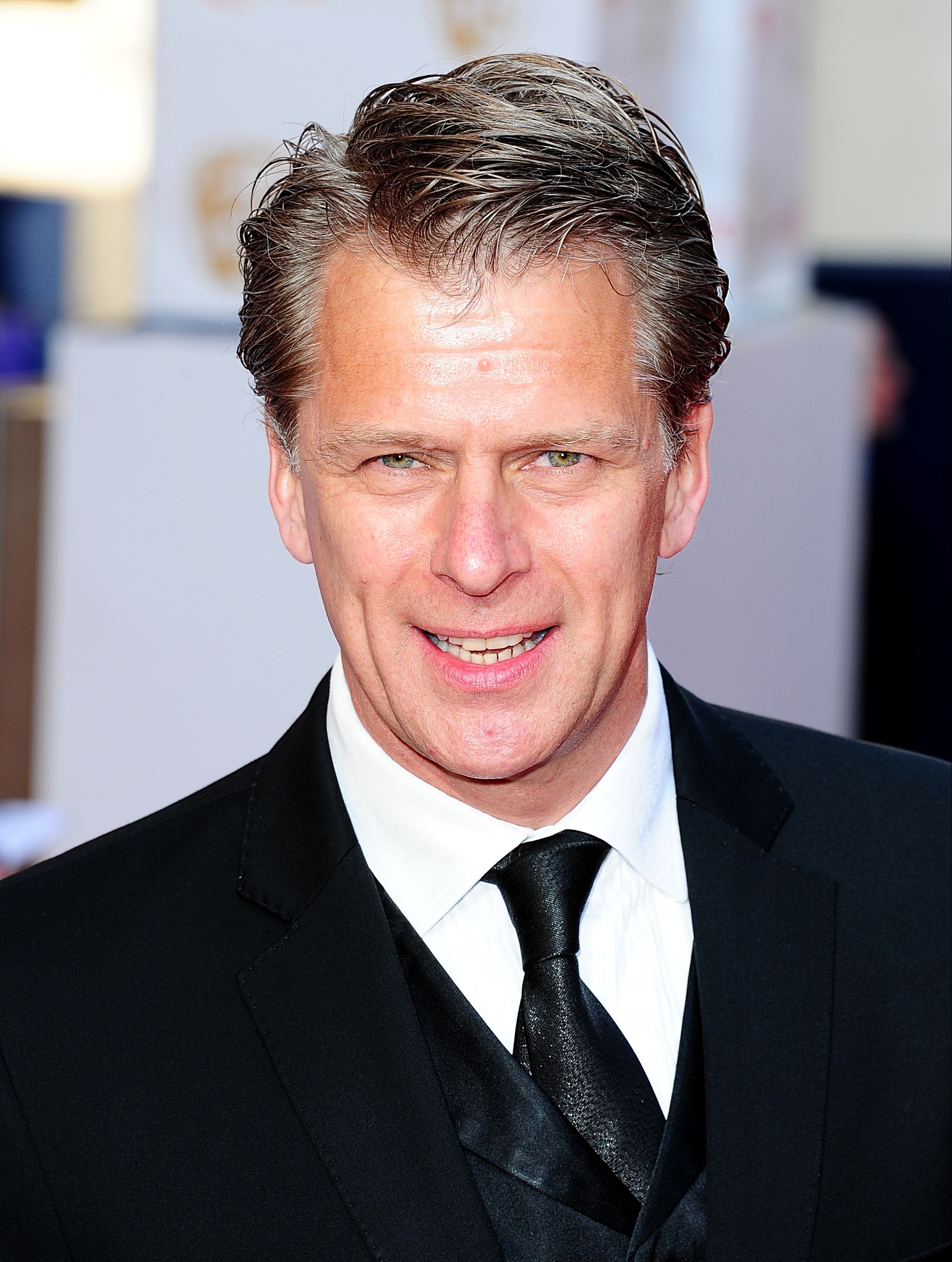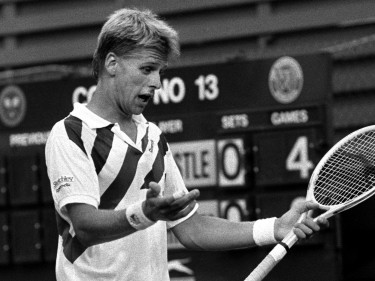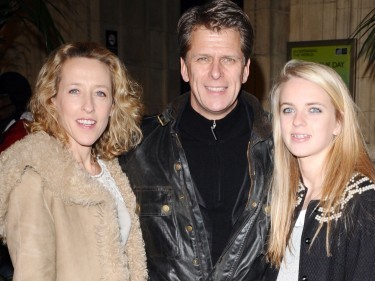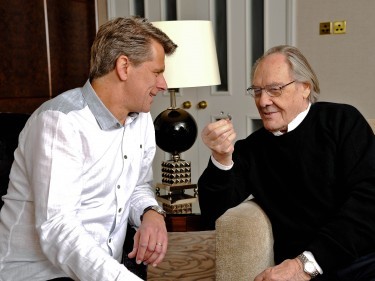Andrew Castle has seen life from both sides of the tennis net as a former British number one and now as BBC’s lead Wimbledon commentator. He tells Gabrielle Fagan what the tournament means to him and how love and a hip operation have changed his life
Andrew Castle is the BBC commentator who in 2013 famously uttered the words every British tennis fan feared they’d never hear – “The waiting is over. Andy Murray is Wimbledon champion.”
The memory, he confesses, still gives him pleasure. But this year, he’s hedging his bets about predicting a repeat of that triumph.
“I never thought I’d see a British victory in my lifetime and I’d love to see Andy do it again but truthfully I’d put my money on Novak Djokovic who’s in a great phase at the moment,” he says.
“He’s world number one, very settled in his personal life with a wife and child, and relaxed because really he has nothing to prove. I think he’ll be deadly and dangerous this year, although I’d put Andy as my second favourite. But the great thing is, you never know in this tournament. Its very unpredictable.”
This ruggedly handsome player-turned-presenter is certainly worth listening to – he’s commentated on every men’s final since 2003 and is the corporation’s lead commentator throughout the fortnight. The tournament, in which he competed in his youth and still does as a veteran, is the highlight of his annual calendar.
“The joy of it was summed up for me a few years ago when I was sitting in the commentary box with John McEnroe waiting for play to begin on Centre Court. It was a sunny day, the scent of freshly mown grass filled the air, and below was literally a picture-perfect scene. We had the best view in tennis – as close to the players as the umpire,” he recalls.
“John and I just turned to each other and said, ’How lucky are we to be here and doing this job?’ It was one of my favourite moments – sharing time with a tennis legend, chatting and getting paid for it. Really it doesn’t get much better.”
It’s a role for which Castle wouldn’t have seemed destined when he was a player. While nowadays he exudes charm and unflappable good humour in the commentary box – where controversy would be as distracting and unwelcome as rain stopping play – Castle’s early life was characterised by an impulsive, reckless streak which led him into battles with authority.
Most notably Castle, 51, who turned professional in 1986, was British number one in 1990 when the furore over the ill-fated community charge was at its height.
Playing in a televised final against Jeremy Bates at the National Tennis Championships at Telford, he stuck a placard beside his seat proclaiming ’No To Poll Tax’. The BBC threatened to stop recording the match, the Lawn Tennis Association was outraged and he lost his £9,000 prize money. He was also fined a record £2,400, forced to accept a gagging order and suspended from the British Davis Cup team.
“I was a sort of stroppy British version of John McEnroe except he won way more matches than I ever did!” he says, laughing.
“I’ve always been opinionated and competitive and I was abrasive when I was a player, no doubt about it. I was the most fined player on the ATP tour and swore at umpires and line judges and chucked my racket around.”
In part that was fuelled by “a working class chip on my shoulder”. His origins were humble. His father was a master fishmonger and Castle, born in Surrey, was the youngest of five children. When fish and chips fell out of favour with the advent of hamburgers, his parents worked as taxi drivers to continue funding his tennis career.
“It was only thanks to the huge struggle and unselfish sacrifice of my family that I was able to follow my dream. I had a thing about authority because I felt as a working class lad I hadn’t got the support from the tennis authorities that I should have done and it definitely made me angry and rebellious at times,” he says.
Falling in love with his wife, Sophia, proved a turning point. “It was love at first sight when I saw her. She was in a Tokyo hotel where she was staying as an air hostess and I was there as part of the Davis Cup team,” he says.
“She’s the best thing to come out of my tennis career and none of what I’ve achieved since would have been possible without her. She 100% smoothed out my rough edges and helped me become calmer.”
They married in 1991 and when Sophia became pregnant in 1992 – the couple have two daughters, actress Georgina, 22, and Claudia, 20 – Andrew retired from tennis. He worked for eight years on Sky Sports reporting on tennis, golf and basketball and moved to breakfast show GMTV in 2000. He interviewed everyone from Israeli prime minister Benjamin Netanyahu to Miss Piggy and presented its last show in 2010.
Two years ago, he experienced another significant moment, a hip replacement, freeing him from eight years of constant pain.
“I still love playing and competing at tennis – I’m in the Seniors’ event at this year’s Wimbledon – but just before I appeared on Strictly Come Dancing in 2008, my right hip, which had been painful for a few years, began getting worse. It was making it difficult to play at my best,” he explains.
“Dancing for hours on the show took its toll, and then in 2010 I took part in 71 Degrees North, a reality adventure show set in the North Pole and Norway. The pain in the hip intensified, perhaps not helped by sleeping in a tent on the ice for a month!”
Eventually diagnosed with severe osteoarthritis, he resorted to painkillers, but “sometimes the pain was so bad I couldn’t sleep at night and when I played tennis I was dragging my leg and limping”.
Since the operation, the difference in his physical ability is so marked that John McEnroe commented after a match, ’What have you done, you’re hitting the balls 30% harder than you used to?’ That’s all down to the hip. We’re so lucky we live in an age where things can be replaced or improved,“ says Castle, who’s backing a Specsavers campaign urging people to have free regular hearing tests following his father-in-law Anders Hilding’s diagnosis of 40-50% hearing loss which has been corrected with hearing aids.
In the commentary box though, Castle’s a firm believer that silence can be golden. “One of the hardest things is to be quiet and let the occasion speak for itself. In recent years, we’ve started to become more Americanised in our sport commentary – they do tend to yammer on much more,” he says.
“But I think you just have to react to events and then shut up a bit. I don’t have a script. My bottom line is only speak if you can add with words to the moment – if not, let the occasion speak for itself.”
Castle, who uttered the succinct phrase “sporting immortality doesn’t come easy” during the 2013 battle between Djokovic and Murray, would relish a rematch between the pair. “Basically, I suppose you either love Murray or you don’t – he’s a bit Marmite – but although Andy’s been a bit of an acquired taste in the past, I think the British public are now behind him. He’s an awesome champion who’s so deserving of more success. He could so easily have settled for being in the top 10 in the world but he just keeps pushing to get more success than that. There’s a lot to be respected.”
Castle’s own dream is even more ambitious than Murray’s aim of Wimbledon victory. “I’d like to live forever and I’m waiting for someone to invent a pill that keeps us alive eternally,” he jokes. “I have a sense of time running a little shorter as I get older, but I’m enjoying myself so much I never want it to end.”
:: Andrew Castle will be part of the BBC tennis coverage of The Aegon Championship at Queen’s Club this week and Wimbledon from Monday, June 22. He and his father-in-law are encouraging people to have free regular hearing tests at Specsavers Hearing Centre. Visit www.specsavers.co.uk/hearing



